Seminar on the Evidence of Manuscripts (April 1994)
August 26, 2016 in Manuscript Studies, Photographic Exhibition, Seminars on Manuscript Evidence, Uncategorized
“King Alfred and His Legacy”
20 April 1994
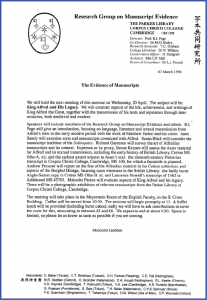 In the Series of Seminars on the Evidence of Manuscripts
In the Series of Seminars on the Evidence of Manuscripts
Faculty of English, University of Oxford
(20 April 1994)
Invitation in pdf.
The previous Event in the series comprised a Workshop, which considered
“Pigment-Analysis of Corpus Manuscripts”
Parker Library, 4 March 1994
and which followed the Workshop on
“Image-Processing and Manuscript Studies”
Parker Library, 15 January 1994
[First published on 26 August 2016]
This was the third of the Seminars in the Series on “The Evidence of Manuscripts” to be held at the University of Oxford and hosted by our Associate, Professor Malcolm R. Godden.

The Alfred Jewel, as depicted by Henry Shaw, ‘Dresses and Decorations of the Middle Ages’ (1843) via Wikipedia Commons.
The 2 previous Seminars at Oxford had considered:
“Research on Anglo-Saxon Manuscripts in Cambridge and Oxford”
Pembroke College, University of Oxford, June 1992
“Anglo-Saxon Manuscripts from Worcester”
Pembroke College, Oxford, March 1993
Plan
The 1-page Invitation Letter sets out the plan for the Seminar:
We will consider aspects of the life, achievement, and writings of King Alfred the Great, together with the transmission of his texts and reputation through later centuries, both medieval and modern.
Speakers will include members of the Research Group on Manuscript Evidence and others.
According to the plan, the speakers and their subjects were these:
- R.I. Page will give an introduction, focusing on language, literature and textual transmission from Alfred’s time to the early modern period with the work of Matthew Parker and his circle.
- Janet Bately will examine texts and manuscripts connected with Alfred.
- Susan Hitch will consider the manuscript tradition of the Soliloquies.
- Richard Gameson will survey the art of Alfredian manuscripts and its context.
- In person or by proxy, Simon Keynes will assess the Asser material for Alfred and its textual transmission, including the early history of British Library, Cotton MS Otho B. xi;
and the earliest extant witness to Asser’s text:
the sixteenth-century Parkerian transcript in Corpus Christi College, Cambridge, MS 100. - Andrew Prescott will report on the fate of the Alfredian material in the Cotton collection,
and aspects of the Burghal Hidage, focusing upon witnesses in the British Library:
the badly burnt Anglo-Saxon copy in Cotton MS Otho B. xi;
and Lawrence Nowell‘s transcript of 1562 in Additional MS 43703. - Malcolm Parkes will evaluate aspects of King Alfred and his legacy.
Also, “there will be a photographic exhibition of relevant manuscripts from the Parker Library of Corpus Christi College, Cambridge.”
This illustrated element of the Seminar derives from the first of the Seminars at Oxford in the Series, demonstrating “Research on Anglo-Saxon Manuscripts in Cambridge and Oxford” (June 1992), whereby the Research Group brought a travelling exhibition of images to represent aspects of the materials and the research in hand. As such, its contribution to the Alfred Seminar stands within the tradition of the Group’s Photographic Exhibitions & Masterclasses.
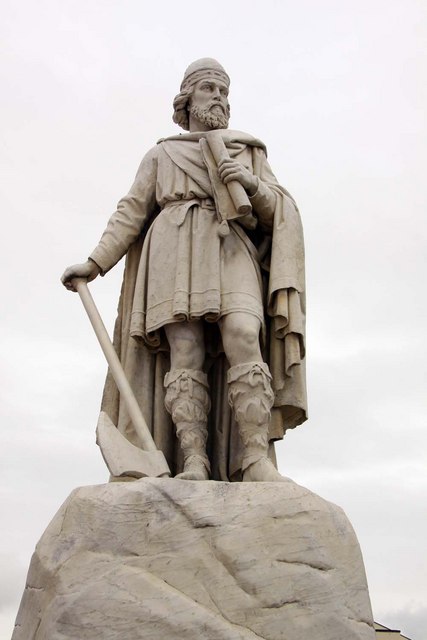
Standing with Axe at rest and Scroll at the ready. Statue of King Alfred the Great in the Market Place at Wantage, Oxfordshire. Photograph by Steve Daniels via Wikipedia Commons.
Place, Time, and Lunch, Not Forgetting the Cakes
The meeting will take place in the Meyerstein Room of the English Faculty, in the St Cross Building. Coffee will be served from 10:30. The seminar will begin promptly at 11. A buffet lunch will be provided (including burnt cakes); sadly, we will have to ask contributions to cover the costs for this, amounting to between £5 and £6. We expect to end at about 4:30. Space is limited, so please let us know as soon as possible if you are coming.
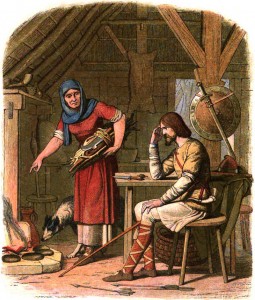
Illustration by James William Edmund Doyle of ‘Alfred in the Neatherd’s Cottage’ in ‘A Chronicle of England: B.C. 55 – A.D. 1485 (London 1864) via Wikipedia Commons.
*****
Participants
Present:
Malcolm Godden, Mildred Budny, Timothy Graham, Richard Gameson, Carole Hough, Janet Bately, Bruce Mitchell, Andrew Prescott, Simon Keynes, Barbara Raw, Peter Jackson, Rohinie Jayatalika, Susan Hitch, Catherine Hall, Michael Borrie, Susan Irvine, Joyce Hill, Michael Winterbottom, Graham Wilkes, Mark Atherton, Rebecca Thomas, Ananya Kabir, Kenichi Tamoto, Patrick Wormald
These names are listed on a single handwritten page, prepared on site by Mildred Budny and retained in the Research Group Archives. The RSVP forms were directed, when completed, to be sent to Malcolm Godden; they did not enter the Research Group Archives.
Absent:
R.I. Page’s undated typescript letter of 19 April to Mildred Budny reports abruptly that “I am sorry I just cannot find the time to be in Oxford tomorrow. Please accept my apologies and present them.” As usual, he addresses this recipient as “Millie”, in a variant of his occasional, determined “Millicent”, despite — or, given his nature, almost certainly because of — her many attempts over the years to correct his mispelling to “Milly”, let alone “Mildred”, ever since she had arrived in Cambridge and especially after she began long-term, full-time employment at his Library in outside-funded research. Interesting, isn’t it, how consistently-selected nomenclature can convey some things very precisely indeed, even when the name itself is not the right one.
This curt message was symptomatic of the multiple ways in which, during the long last months of the Research Project, Ray Page’s interest in, and consideration for, the Research Project lessened significantly. As its tenure began to draw to a close, with plans advancing for the move of the Research Group on Manuscript Evidence to America, hand-in-hand came the waning of its perceived potential as a forceful tool in his power plays.
Report
The Research Group Archives possess a 3-page handwritten “Report” by Mildred Budny in the form of outlined Minutes on the day. In numbered items, the report records the “sequence of [the] seminar” in terms of speakers and their subjects as presented. To summarize her summaries:
- Mildred Budny gave an introduction to the Research Group work on manuscripts with Alfredian texts, with examples, not forgetting the Alfred Jewel in the Ashmolean Museum
- Janet Bately surveyed the Alfredian canon of texts, including the Prefaces to the Pastoral Care, the Dialogues, the Laws, Alfred’s Will, and other texts
- Richard Gameson — with a unexpected title and subject different from the plan: ‘King Alfred and the Destruction and Construction of Christian Books’ — surveyed the 9th-century destruction of libraries in a European context as a setting for Alfred’s literary labours, endeavouring to construct libraries out of chaos
- Susan Hitch considered the manuscript of the Soliloquies (Cotton MS Vitellius A.xv, Part I) with an examination of its contents (the other texts included), layout, script, rubrication, punctuation, and history
- Simon Keynes considered the earliest surviving copy of Asser’s Life of Alfred (Corpus MS 100), a Parkerian transcript of John Leland‘s copy, as an object lesson in Anglo-Saxon studies, in passing from one important collection to another, from Matthew Parker’s to Sir Robert Cotton‘s
- Andrew Prescott surveyed the history of the Otho manuscripts in the Cotton collection from the fire of 23 October 1731 onwards, including an evaluation of the extents of damage suffered by which presses (most of all in the Tiberius, Caligula, Galba, Vitellius, and Otho presses), as well as the further destruction of 47 surviving folios in a fire in the British Museum bindery in the evening of 18 July 1865
- Malcolm Godden discussed the format of manuscripts of Alfred’s works in his own time and the next 2 centuries, particularly the Boethius in both prose and verse versions and the Dialogues, as found in Cotton MS Otho C.viii and MS 322
This was the first, and hopefully the only, time in the history of events of the Research Group on Manuscript Evidence that, without notice to the organizers, a speaker began his presentation by saying that he was going to talk about a different subject than the one we had expected and prepared for.
Related Seminars in the Series
Earlier Seminars in our Series considered Alfred and his legacy, often through manuscripts of his texts, about his life, or of his times. Besides the 2 Seminars already held at Oxford, these included:
- “Facsimiles, Diplomatic Texts and Editions”
with a preview of The Palaeographical and Textual Handbook
Parker Library, March 1990 - ‘Sixteenth-Century Interventions in Anglo-Saxon and Related Manuscripts’
Parker Library, April 1990 - ‘Sixteenth-Century Transcripts of Anglo-Saxon Texts’
Parker Library, October 1991
*****
The next Seminar in the Series considered
“Marginalia in Manuscripts”
Parker Library, June 1994
*****

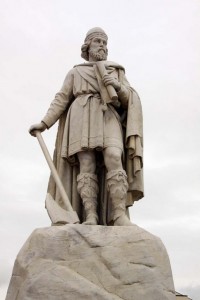
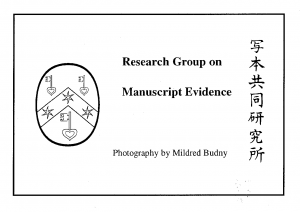



I remember that I attended the seminar, sitting silently. Now I’m surprised to find my name on the list of participants.